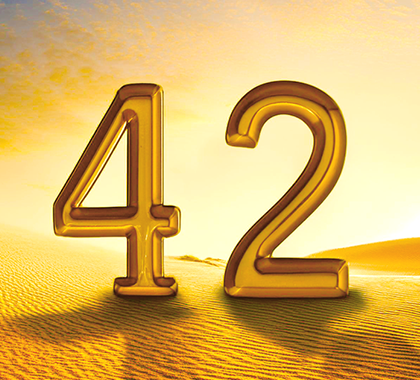Aug 01, 2024
Parshat Matot-Massei 5784
The Journey of Life
By Rabbi Johnny SolomonEarlier this week I heard a Dvar Torah by Rabbi Hagai Londin on Parshat Massei which I’d like to share with you as it conveys a deep idea about the journey of life.
This Shabbat we will be reading the final two parshiot of Sefer Bemidbar, Matot & Massei, with Parshat Massei listing the forty-two locations where Bnei Yisrael stopped along their journey from Egypt to Israel (see Rashi on Bemidbar 33:1).
Quoting the Maharal, Rabbi Londin explained that the number 42 signifies journeys and transitions, and he then mentioned how the stunning poem by the 2nd century Tana Rabbi Nehunya ben haKanah, titled Ana BaKoach, intentionally contains 42 words and is understood to reflect this same idea of journeys and transitions.
Rabbi Londin then spoke about the four occasions when we say Ana BaKoach:
i) In the prayers before reciting the Bedtime Shema – which points to the transition from waketime to sleeptime, and the journey that our soul makes each night when we go to sleep;
ii) Between Kabbalat Shabbat and Friday night services - which points to the transition and journey from the weekday to Shabbat;
iii) In the meditations preceding the counting of the Omer – which points to the transition and journey from Pesach to Shavuot, and from the Covenant of Fate to the Covenant of Destiny, and,
iv) At a Jewish funeral – which points to the transition and journey of the soul from this world to the next world.
What this teaches us is that we all experience transitions, and we all go on journeys every day and night, every week, throughout the Jewish year, and at the beginning and end of our life.
Faith and life as a journey
Holding this thought, Rabbi Londin then reflected upon some of the words and phrases of this beautiful poem, noting how Ana BaKoach petitions God to ‘strengthen us’, to ‘guide us’, and to ‘accept our entreaties and hear our cries’.
At the same time, it concludes with a proclamation that God is the ultimate ‘knower of mysteries’ - which serves as a reminder that there are moments in our journey through life when we don’t fully understand what is going on - at which point we rely on our faith in God who is the ultimate knower of mysteries.
To be clear, this idea of faith and life as a journey is not a new one. For example, Rabbi Sacks frequently spoke about the idea of faith-as-journey, writing that: ‘Faith is the space where God and humanity touch. For Jews it has always been symbolized by a journey, the journey begun by Avraham when he left his country and his father’s house to travel to an unknown land, the journey taken by the Israelites as they left Egypt for the promised land, the journey each of us could trace if we could follow our grandparents and theirs back through the generations as they wandered from country to country. The way is always further than we thought, the route more complicated and beset with obstacles. But we continue it knowing, sometimes obscurely, sometimes with blazing clarity, that this is what God wants us to do. For we know that so long as the way the world is, is not the way it ought to be, we have not yet reached our destination’ (Faith in the Future pp. 2-3).
Still, by applying the wisdom of Ana BaKoach to the various transitions and journeys of our life, we learn an important lesson which is that while there are parts of life which are easier to understand, there are other parts which are much harder. Yet even in those moments – or, expressed differently - perhaps especially in those moments, we should remember that we are not alone.
Shabbat Shalom!





